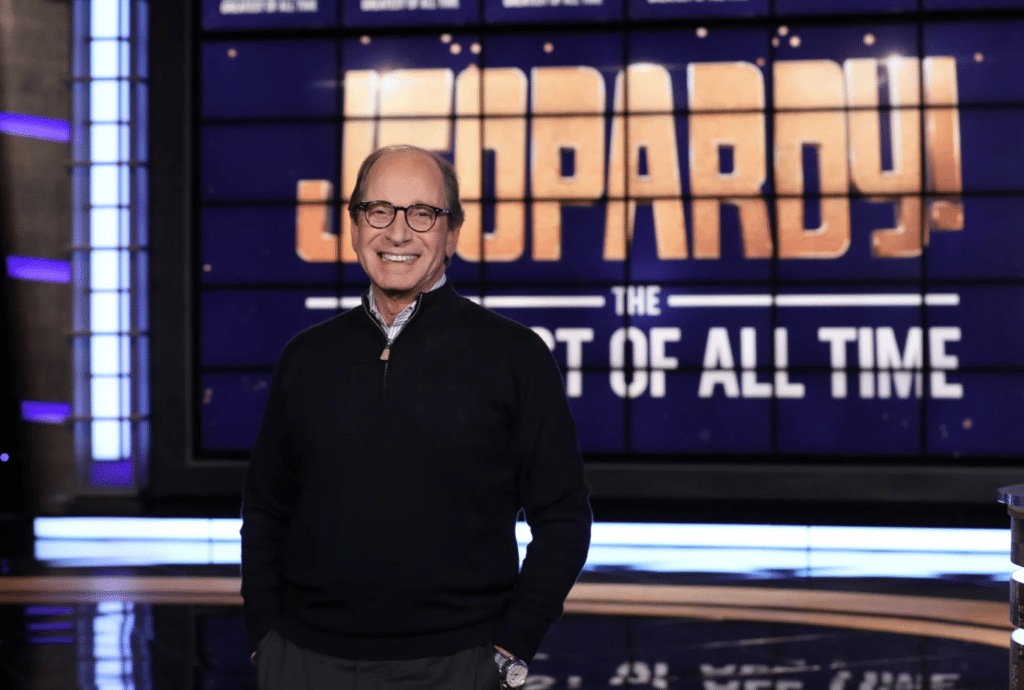By Adam Nedeff, researcher for the National Archives of Game Show History
It’s back-to-school time, so this is a reminder to the parents and guardians out there to make sure your students are all stocked up on class supplies—pencils, notebooks, folders, buzzers, and bells. Wait, buzzers and bells?
That’s right. Game shows have gone back to school. In 2024, National Archives of Game Show History co-founder Bob Boden and longtime Wheel of Fortune and Jeopardy! executive producer Harry Friedman established a curriculum of academic courses about game shows for California State University, Los Angeles (Cal State LA).

Friedman explains, “I was at a TV Academy Foundation conference about three years ago. I was randomly seated next to Dr. Dina Ibrahim, who was heading up Cal State University’s entertainment alliance. We talked and she seemed intrigued by the work I did. We began discussing game shows, and how ubiquitous they are, and the effect they’ve had on pop culture.”
Friedman, half-jokingly, told Dr. Ibrahim, “I think you should have a course about game shows, how to produce them, and how to develop them.”
To Friedman’s surprise, she liked the idea. Dr. Kristiina Hackel, the head of the Department of TV, Film and Media Studies at Cal State LA, asked Friedman to draft a proposal for coursework. Friedman called Bob Boden and asked if he could help brainstorm some ideas for the course.

Friedman says, “90 minutes later, Bob [sent] me a fully formed 13-week production course schedule. It turned out that this was something that Bob had already tried to create for UCLA, and they didn’t move forward with it. We modified maybe 10 percent of Bob’s original idea, just because the entertainment business had changed enough in that time that the class had to reflect those changes, but everything we needed was already there.”
Students who are interested can take three classes over a series of semesters. They begin with a class called “Get in the Game,” an introduction to game and reality competition shows. The second semester is called “The Game Plan,” focusing on how to develop game show formats and sell them to production companies, networks, and media platforms. The third semester, “Hands on Buzzers,” explores the ins and outs of how to produce a game show.
The professors are game show production veterans Stuart Krasnow, Shannon Perry, Sean Loughlin, and Joey Ortega. Ortega taught high school for three years prior to going into game show production, and that academic background was partly why he was asked to help teach these courses.
Ortega says, “Cal State LA is interesting because there’s such a mix of students. Some are later-in-life students who want to change careers, some are 22 and just about to step in the real world. For the game show curriculum specifically, a lot of our students are media majors; film and television production majors. Many of them hadn’t thought of game shows as a pathway to a career. They came here thinking of a media career in terms of ‘filmmaking’ and the game show classes have taught them that there’s this other route that they can take.”
At a time when the media landscape is in flux, and the way people consume entertainment has changed so drastically in only a single generation, Ortega has been fascinated by learning about what his students already know, and delighted by the opportunity to expand their horizons.
“A lot of my students tend to come into the class knowing Deal or No Deal, Wipeout, and Family Feud. These are the shows that they’ve grown up with. It’s so much fun to introduce them to classic games and get their reactions. I love showing my students Pyramid, particularly the Winner’s Circle round. You can see it in their faces—they are locked in when they see the Winner’s Circle; that game has their full attention every time.”
Harry Friedman says, “I observed classes a couple of times and was blown away. Not just by what the students were learning, but by their creativity, their teamwork, and their work ethic. There were so many transferrable skills being taught in these game show classes that they will be able to take with them no matter what they may end up doing.”
The game show curriculum is still quite new but has already shown the potential for creating careers and impacting the genre. In several weeks, a pilot will be recorded for a new game show format that was developed by a student in the Cal State LA classes.
Friedman explains, “Everybody in the class will be part of the team making the pilot. There will be schedules, deadlines, assigned roles and duties, budgets. Everything involved in making a pilot, and it’s going to involve these students.”
——————————————————————————————————————————
The author of this article majored in radio & television with a focus on journalism because it was the closest thing available to a game show curriculum. The author seethes with envy at a new generation of college students who have the chance to watch Let’s Make a Deal and The Price is Right because they’re doing homework.



